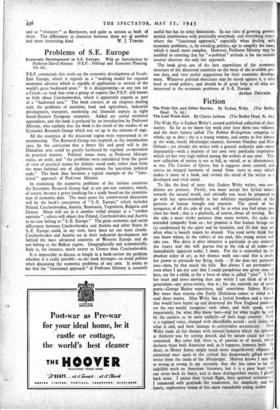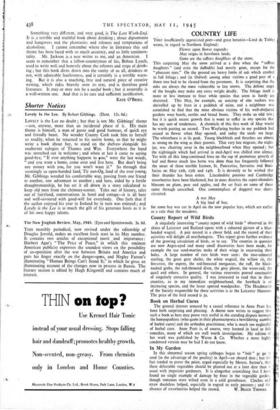Fiction
The Wide Net, and Other Stories. By Eudora_ Welty. (The Bodley Head. 7s. 6d.) The Lost Week-End. By Charles Jackson. (The Bodley Head. 8s. 6d.)
The Wide Net is Eudora Welty's second published collection of short stories. So far as we know her work over here these two volumes and the short fantasy called The Robber Bridegroom comprise its
whole, up to date ; she is a young woman, and seems to live always in the wide, lonely Mississippi country, between Natchez and New -Orleans ; yet already she writes with a general authority and—more importantly—with a mastery of her own very particular inspiration
which set her very high indeed among the writers of our time. This new collection of stories is not as full, as varied, or as idiosyncratic as was The Curtain of Green, but it suggests more control, and carries an integral harmony of mood from story to story which makes it more of a book, and reveals the mind of the writer as 3 developed and vivid entity. •- To like the kind of story that Eudora Welty writes, two con- ditions are primary. Firstly, you must accept her lyrical outcry towards the natural world, and secondly you must be prepared to go with her open-mindedly in her arbitrary manipulation of the patterns of human thought and emotion. The proof of her arrogance, of all she asks of you, will lie in what you feel when you close her book ; that is a platitude, of course, about all writing. But she asks a more tricky patience than many writers, she seeks an extended sympathy from us ; her premise is that human beings are (a) conditioned by the spirit and by intuition, and (b) that they are often what is loosely meant by absurd. You need never think that you know where, in the valleys of the soul, this young writer will take you. Her drive is after whatever is particular in any creature she essays and she will pursue that at the risk of all order—all immediately apparent order, I mean. For she is controlled by the absolute order of art, as her themes work out—and that is truth; her power to persuade her flying truth. • If she does not persuade you—then, by that much she fails. But always I am persuaded— even when I am not sure that I could paraphrase any given story of hers, say for a child, or for a lover of what is called " plot." I find her truer and more moving than any writer I can think of of her generation—any prose-writer, that is ; for she reminds me of some poets—George Barker sometimes, and sometimes Sidney Keyes. But more than anyone else Emily Dickinson comes to mind as read these stories. Miss Welty has a lyrical freedom and a vigour that would have burnt up and destroyed the New England poetess ; yet the two would recognise each other, and both speak, most importantly, for what tliey know best—and for what might be said by the careless to be most unlikely—of their huge country. Each is a regional voice, charged with identifiable accent ; each insists on what is odd, and both manage to universalise eccentricity. Miss Welty loads all her themes with sensual beauties which the spinster at Amherst was by setting denied, and by nature could not hare contained. But some link there is, of passion or of moral, which declares them both American and, as it happens, honours both. In short, as Henry James might much more magnificently ellipsise. commend once again to the critical this dangerously gifted. young writer from the lands of the Mississippi. Heaven knows I may be as wrong as wrong in my certainty that she has come to lay an indelible mark on American literature, but it is a poor heart that can never back its fancy, and in these distinguished stories I gladly back mine. I praise their lyrical flight, their spiritual seriousness ; I commend with gratitude the tenderness, the simplicity and the lonely, exploratory vision of this most remarkable young writer. Something very different, and very good, is The Lost Week-End. It is ,a terrible and truthful book about drinking ; about dipsomania and hangovers and the phantasies and releases and temptations of alcoholism. I cannot remember where else in literature this sad theme has been faced with so much accuracy, and so little sentimen- tality. Mr. Jackson is a new writer to me, and an American. I seem to remember that a fellow-countryman of his, Bohun Lynch, used to write well and honestly about the releases and traps of drink- ing ; but this book dives down into the vanity of us all, drinkers or not, with admirable fearlessness, and it certainly is a terrible warn- ing. But it is also a touching, free and natural piece of creative writing, which rides bravely over its text, and is therefore good literature. It may or may not be a useful book ; but it assuredly is a well-written one. And that is its rare and sufficient justification.
KATE O'BRIEN.























 Previous page
Previous page